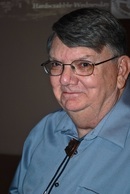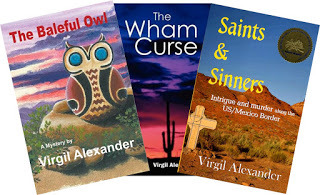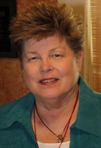Why Research for Fiction? by Virgil Alexander
 Virgil AlexanderClearly if you are writing a nonfiction book (unless it is one-hundred percent your own memoir andyou have a great memory) you will expect to do a lot of research before you start writing and during the course of writing.
Virgil AlexanderClearly if you are writing a nonfiction book (unless it is one-hundred percent your own memoir andyou have a great memory) you will expect to do a lot of research before you start writing and during the course of writing.Fiction, however, is from the beginning not fact, but a product of the writers imagination. Therefore, it could be argued that no research is necessary. The author has the power to make anything be true in the world being created.
Unless the story is intended to be extreme fantasy or pure nonsense, some research is in order. When setting your story you should research the locale so that place names, directions, climate, and nature used in the book fit the place. If you are writing about processes, whether natural, industrial, scientific, government, or social, you should research them.
All my books are mysteries set in the American Southwest, the place I have lived for seventy years. I am well-traveled in the area and well-read in the cultures and natural and human histories of the region. Yet, for each of my fiction novels I did extensive research on the areas important to the story.
 My first book,
The Wham Curse
, is set primarily at and around the site of the 1889 robbery of the US Army payroll under the protection of Major Joseph Wham. The story briefly recounts the history of that historic robbery then fictionally answers what became of the lost loot, and what happens when it is found in modern times (a murder of course). I extensively researched the history of the robbery and the resulting trial in which all accused were declared not guilty. I also researched rural and tribal police agencies and the differences between rural police work and urban policing. I research the medical science of the brain and fetal alcohol syndrome. Even though I lived in the areas involved, I researched them extensively.
My first book,
The Wham Curse
, is set primarily at and around the site of the 1889 robbery of the US Army payroll under the protection of Major Joseph Wham. The story briefly recounts the history of that historic robbery then fictionally answers what became of the lost loot, and what happens when it is found in modern times (a murder of course). I extensively researched the history of the robbery and the resulting trial in which all accused were declared not guilty. I also researched rural and tribal police agencies and the differences between rural police work and urban policing. I research the medical science of the brain and fetal alcohol syndrome. Even though I lived in the areas involved, I researched them extensively.In Saints & Sinners I set it in the same general area as the earlier book, but also included Northern Sonora and Spain, so did a great deal of research on those areas. The story includes a lot about border smuggling and drug cartels, so I researched that in detail. There is a wedding which involves Mexican customs, so that was heavily researched. Mexican police play an important part as do the US Border Patrol and Immigration Service, so I researched those agencies and the history of international cooperation between them. Finally I had a Mexican culture editor review and correct inaccuracies of that culture, the Catholic wedding practices, and Mexican Spanish.
The Baleful Owl involves the namesake Salado Indian effigy ceramic in artifact theft and murder. I did extensive research on the ancient Salado Culture, archaeological practices, and the legal and illegal artifact trade. I also researched Apache archaeology and basketry, early Sobaipuri culture, and the process for returning ancient funerary items to modern tribes for reburial.
Why do such research? The most powerful reason is to make the story more believable and more interesting to the reader. Also, I have a great love for the places, cultures, and people I am writing about – I want to provide some level of understanding of them to my reader.
Virgil Alexander is an Arizona Historian who in addition his three published mystery novels, has been writing the non-fiction Ranching in the Heart of Arizona for several years. He does consulting and presentations for museums, contributes to online magazines and history webpages, He will be presenting a paper at the upcoming Arizona History Convention.
Read more about Virgil and his books at his website.
Published on February 21, 2016 04:00
No comments have been added yet.



